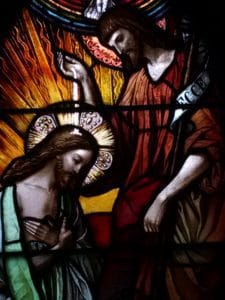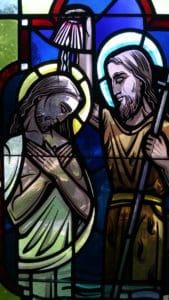This Sunday Saint John the Baptist’s birthday is celebrated in solemn style. We share this Franciscan Gospel reflection and questions written by Fr. Paul Gallagher, OFM. They are edited by Franciscan Sister of Christian Charity Sister Anne Marie Lom and Joe Thiel. The excerpts from the Sunday readings are prepared by Joe Thiel. To read or download the complete pdf with excerpts for your prayer, please click here: Franciscan Gospel Reflection June 24 2018. Excerpts from the Lectionary for Mass for Use in the Dioceses of the United States of America, second typical edition © 2001, 1998, 1997, 1986, 1970 Confraternity of Christian Doctrine, Inc., Washington, DC. Used with permission. All rights reserved. No portion of this text may be reproduced by any means without permission in writing from the copyright owner. Please include this information when printing.
Photos: Holy Name Parish, Sheboygan, Wisconsin and St Boniface Parish, Chetek, Wisconsin
Luke 1:57-66, 80
When the time arrived for Elizabeth to have her child she gave birth to a son. Her neighbors and relatives heard that the Lord had shown his great mercy toward her, and they rejoiced with her. When they came on the eighth day to circumcise the child, they were going to call him Zechariah after his father, but his mother said in reply, “No. He will be called John.” But they answered her, “There is no one among your relatives who has this name.” So they made signs, asking his father what he wished him to be called. He asked for a tablet and wrote, “John is his name,” and all were amazed. Immediately his mouth was opened, his tongue freed, and he spoke, blessing God. Then fear came upon all their neighbors, and all these matters were discussed throughout the hill country of Judea. All who heard these things took them to heart, saying, “What, then, will this child be?” For surely the hand of the Lord was with him.
The child grew and became strong in spirit, and he was in the desert until the day of his manifestation to Israel.
Background
The celebration of the Nativity of St. John the Baptist does not usually fall on a Sunday. When it does, as it does this year, the Scripture readings are proper to the feast. The birth of John is one of the three births that the Church celebrates each year, the births of Jesus and Mary being the other two.
Like with Christmas, the Church places the celebration of this feast in relation to cycles of nature, at least in the Northern Hemisphere. Christmas is celebrated just as the days are beginning to grow longer, emphasizing that Jesus is the one who dispels the darkness. In contrast, the church places this feast of the birth of John the Baptist just as the days begin to grow shorter. This reinforces John’s own statement, “He must increase; I must decrease.” (John 3:30)
Births are always a dramatic entry into history. Each birth brings with it two hopes. The first is that this child will have a better life than those who have gone before. The second is that somehow this child will have a positive impact on the world. There are those who even believe that the cosmos is changed in some way by the birth of each child. The magi saw the star in the night sky that marked the birth of Jesus.
The birth of John the Baptist is only important because he points out and proclaims the importance of Jesus. But the Church still understands his birth to be so important that its celebration takes precedence over the normal cycle of Sunday celebrations. This is done very rarely, especially for someone who was never a disciple of Jesus. Yet John spent his adult life preparing the Jewish community and the world for the arrival of Jesus in human history.
Circumcision is the sign of incorporation into the Jewish covenant community. This is a day of celebration, both for Elizabeth, since the embarrassment of her barrenness has been removed, and for the community, who receives and welcomes a new member. The importance of the community is apparent in their active role in determining the name of the child. The custom would have it that he would be named after his grandfather. The people are surprised that Elizabeth wants to give him the name John. The community questions her choice, and therefore they consult his father Zechariah. The dialogue makes it clear that the family and neighbors have a vested interest in the situation. The child is given the name “Yehohanan,” which means “Yahweh is gracious.”
The last verse states simply that John spent his life in the desert until the time when he began his public ministry. Luke tells of John the Baptist in a way that parallels the life of Jesus. Both births happen through extraordinary intervention, both spend time in the desert before their public life, and both have a divine mission to fulfill.
Reflection Questions
1. The last time a couple announced that they were pregnant I found myself thinking …
2. Do you know the story of how your name was chosen?
3. When I think of Elizabeth and Zacharia finally becoming pregnant, I …
4. When I think of this community gathering to circumcise and give the baby John a name …
5. How does this reading to speak to you of God’s desires for you and your life?
6. Can you take time to talk to God about your own hope for your life, or your sense of God’s desire for you, or whatever else arose within you as you reflected on this gospel?




